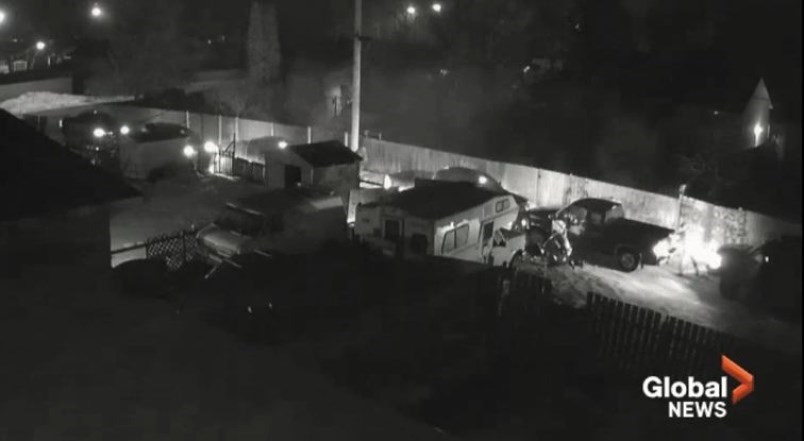A witness for the Crown has praised the actions taken by an RCMP dog handler facing criminal charges from an arrest caught on a security camera that suggests excessive force was used.
A trial began this week for Cpl. Joshua Grafton, who faces one count each of assault, assault with a weapon and obstruction of justice in relation to a Feb. 18, 2016 arrest of two men - Cuyler Aubichon and Nathaniel Basil - after police boxed in their stolen pickup truck in an alley off the 2200 block of Oak Street.
About a month later, and after an uproar over the actions depicted in the video after it was posted on social media and obtained by media, Alison Carstairs, then an investigator with the Independent Investigations Office, B.C.'s civilian-based police watchdog, was sent to Prince George to gather evidence.
Testifying Thursday at the courthouse, Carstairs confirmed that in her opinion no excessive force was used and effectively commended Grafton for how well the dog responded to commands when Aubichon, the truck's driver, was pulled out of the vehicle.
She said police making the arrest were in a high state of "survival stress" brought on by the fact that although the truck was stolen, no step had been taken to hide the fact.
"I'll give an example. You've got a stolen vehicle, you've got an exact vehicle in the next town that looks like it. You go and steal their plates and you replace their plates and then you put their plates on there and they act like the vehicle is not stolen...they are driving just like an everyday normal person," Carstairs said.
When police come across a stolen vehicle still bearing its original licence plates, it raises a concern that they may be dealing with a "high risk" takedown, Carstairs told the court, because it suggests the suspects are being "arrogant, they're not caring about being caught" and are more likely to be carrying weapons.
Carstairs said police took the "safest tactical option" when they trapped the truck in the alley and that the use of force shown in the initial 50 seconds of the video was justified because Aubichon was not releasing his hands.
"The risk remains high until the officer can see there is not a gun or a knife in that person's hand and once the dog has taken a hold and they've managed to turn the person around and struck him and he's decided to be compliant, it's at that moment in time that you assess it, was this unreasonable? And it took two to three seconds in the video, from my notes, to release his dog," Carstairs said.
Carstairs called the dog's quick response to Grafton's command "remarkable."
Carstairs testimony was provided after she was presented during direct examination by the Crown with a three-page opinion she produced in April 2016. Carstairs, who is no longer with the IIO, had been called to confirm continuity of the evidence she had secured and she has not been qualified by the court as an expert on the use of force.
In a lawsuit filed against Grafton, as well as federal and provincial governments, Aubichon says he suffered include bite marks to his face and a hand, bruising over a forearm as well as his sternum, bleeding to the back of his head from the baton and unspecified injuries to his upper thigh and ribs and that he never received treatment for them.
A trial for two other Prince George RCMP members who arrested Basil was cut short last week after Crown stayed its prosecution, citing a lack of sufficient evidence.
It took more than two years for the IIO to submit its findings to the B.C. Prosecution Service and, in turn, another two years before charges against the three were approved.



